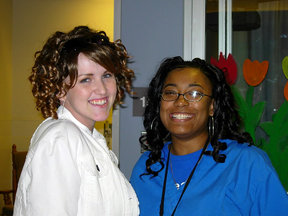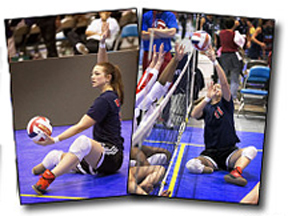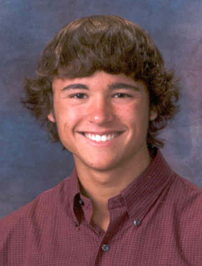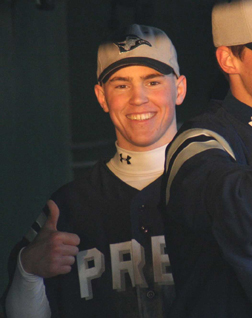“Shannon, there’s something I have to tell you.It’s cancer.”
“Oh, is it lymphoma?” asked the eldest daughter on the front steps of Omaha North High School, remembering the Hodgkin’s lymphoma Web site she had stumbled upon earlier.
“Yes..”
OK, the senior said knowing she would lose her long blond hair. Mom, “I want to get a pink wig to wear on Tuesdays.”
 |
Shannon Pokorny, left, with her friend, Leslie Walker, a clerical associate in The Lied Transplant Center. |
Each year, the UNMC Pediatric Oncology Department receives a handful of high school graduation invitations. Each is a story of triumph – a fragile balance of academics and medical appointments. This year was no different – until the pediatric oncology team realized they had not three or four, but 14 on their desk addressed to “our UNMC family.”
One of them is from Pokorny.
“For a relatively small program this just reminds us of the remarkable progress we’ve made in treating childhood cancers,” said Peter Coccia, M.D., professor of pediatric hematology/oncology at UNMC. “When I got into this business in the early 70s we were probably curing less than 20 percent of children with cancer and other serious bone marrow disorders.”
Today, advances in chemotherapy and bone marrow transplants have raised the cure rate to more than 80 percent, Dr. Coccia said. That’s particularly sobering when you realize that, based on their diseases, only one-third of this year’s 14 would have celebrated their high school graduation 30 years ago, he said.
“Whatever it takes,” Pokorny tells the oncologist explaining how they’ll fight the cancer.
It’s exactly that can-do, “there’s always tomorrow,” Pokorny attitude that carried this ‘A’ student through her senior year of chemotherapy, hospitalizations and radiation.
After visiting her family doctor in April 2005, Pokorny tested positive for mono, so, for months, doctors treated her fatigue with antibiotics. But, a CT scan and day-before-homecoming biopsy yielded another answer: Hodgkin’s lymphoma.
She was referred to the UNMC Pediatric Hematology/Oncology program. There, her oncologist explained she would need six cycles of chemo and a month of daily radiation treatments, Pokorny was happy to finally have a reason for her constant fatigue.
“It’s inspiring to see the obstacles these kids have had to get through to reach this point,” said oncology case manager Nancy Andrews.
Approximately 11,000 children — 1 to 20 years old — in the United States are diagnosed annually with leukemia, lymph node cancers, brain tumors, bone and soft tissue sarcomas, and other childhood cancers, Dr. Coccia said. In all, about 1.4 million new cases of cancer are reported in the United States each year with 565,000 deaths expected this year. Children, however, make up less than 1 percent of the new cases and only about 2,500 deaths.
Unlike adult cancers, childhood cancers are usually aggressive and rapidly fatal without treatment, Dr. Coccia said. Chemotherapy, however, works well on these fast growing cancers, which is why cure rates have skyrocketed. Today’s pediatric oncology patients also benefit from multimodality therapy, including surgery, radiation therapy and chemotherapy. Other advances include improvements in the treatment of infection, other supportive care measures, and more effective, less toxic chemotherapy schedules.
Some of the 14 patients have had prolonged hospitalizations and life-threatening therapies. Four had bone marrow transplants. “But to know these kids you wouldn’t know it,” said Suzanne Nuss, clinical nurse specialist. “They persevered to keep up with their peers. They’re highly motivated to succeed and become better people because of the cancer.”
 |
Allison Aldrich wasn’t deterred by cancer. She went on to earn a bronze medal in the 2004 Paralympic games. |
Humor, faith and family helped Aldrich through her darkest days, which included amputating her right leg in the fall of 1995. “I’ve been blessed with so many opportunities that have molded me into the person I am today,” she said.
An avid athlete, Aldrich graduates May 21 – one month before her sitting volleyball team competes in the 2006 Women’s Sitting Volleyball World Championships, which is set for June 18-26 in Roermond, the Netherlands. The team has set its sights on another Paralympic medal at the 2008 Paralympic Games in Beijing, China.
There are no limits in life, says Aldrich, who has been cancer free 11 years. “If I can do it with one leg, I know others can do it with two.”
Despite months of chemo and seven surgeries, including one this past December, Derek Neben capped his senior year with a 4.0 GPA. He plans to study biochemistry at Nebraska Wesleyan this fall with dreams of becoming a surgeon.
 |
Derek Neben |
“Cancer is kind of annoying,” said Neben, who earned his diploma on Mother’s Day. “I just took it one day at a time and knew no matter how hard it got, the end was always in sight.”
In July, the Papio pool lifeguard will celebrate the fifth anniversary since his surgery to remove the tumor – a milestone that signifies a markedly reduced chance for recurrence.
Neben knew he’d return to the athletic field – it was just a matter of time. Even mom was amazed at her son’s resilient attitude, noting: “He got really quick on his crutches.”
Omaha Creighton Prep senior Michael Gerken jokes with his oncologist: “OK, I’ll do that for you,” he says, “but now let’s talk about taking out the central line.” The intravenous catheter, used to deliver chemotherapy or antibiotics, is impeding on Gerken’s summer of baseball, water skiing and swimming.
 |
Baseball is one of Michael Gerken’s favorite pastimes. |
“Creighton Prep has been totally supportive in helping him do what he had to do to graduate,” said his mother, Milissa Gerken, a clinical lab specialist at The Nebraska Medical Center. “We’re relieved and grateful..for quite awhile we weren’t sure he’d be able to be at the ceremony.”
But, as Gerken says: “I’ve got things to do.” His post-May 21 graduation plans include college at Iowa State, where he’ll study engineering. Cancer is something he’s going through, he says, but it doesn’t define him.
“He’ll say ‘just tell me what I need to do and you worry about the rest.’ Which is fine with us,” his mother says. “You go ahead and be a kid.”
That’s possible, his mother said, because of the support from his medical center team, which have included Bruce Gordon, M.D., Nuss and oncology case manager Jeanine Kean. “They have gone out of their way to help Michael do all the things that are important to him,” Milissa Gerken said, including scheduling his treatment around prom, school events, baseball games, family reunions and college visits. “It is a lot easier for Michael to be positive when he is surrounded by people who understand that cancer patients need to be allowed to be kids and their cancer does not have to completely take over their life. They do have a bright future ahead and they are encouraged to plan for that.”
For Pokorny, cancer became the guidance counselor who shaped her career plans. Instead of teaching art, Pokorny now wants to become a nurse practitioner, specializing in pediatric oncology. She will study pre-nursing this fall at the University of Nebraska at Omaha.
“I’m so thankful for the cancer,” Pokorny said minutes before one of her final 15-minute radiation treatments. “It’s made me a better person.”
She’s already looking beyond her May 25 graduation.
“I have so much more to do. It’s the beginning of the rest of my life.”